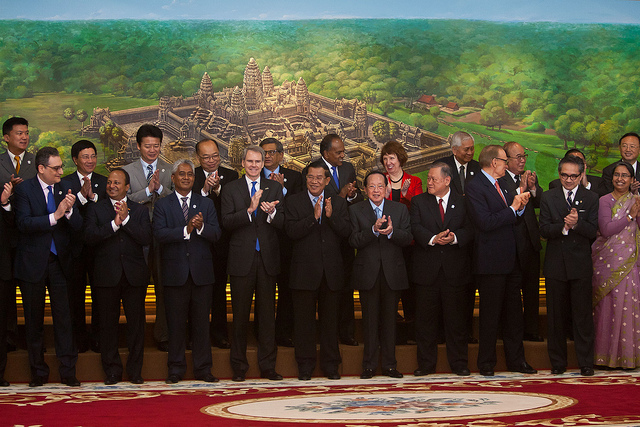
Europe’s 20th century offers Asia ample warning about the concert or cataclysm choice. But the solution Europe produced to deliver its own peace in the second half of the 20th century is of limited utility to Asia, a judgement succinctly expressed by the academic Roger Buckley: 'The European model of creeping federalism is a non-starter—the letters USA are not about to stand for the United States of Asia'.
Along with economic shifts and the tide of history, Asia's creation of itself is also about face and pride (with the hope that lots of fear will keep the hubris in check). Europe is becoming useful in defining what Asia is
not becoming.
European dynamics have determined the current international system. Europe created the nation state, wrote the language of diplomacy and the rules of war, then drew the map of the world in the quest for empire. Europe’s revolutions, concerts and wars drove industrial and colonial history. Europe will continue to be a player, but perhaps not always in the main game. The Cold War looks like the last gasp of the global order as an expression of European politics.
Eric Hobsbawm wrote a great four book definition of this history:
The Age of Revolution (1789-1848), covering both the French and the Industrial revolutions;
The Age of Capital (1848-1875);
The Age of Empire (1875-1914); and the short 20th century,
The Age of Extremes (1914-1991). Adopting those stepping stones, we've entered The Age of Asia.
The success or failure of Asia’s security system in the 21st century will be decisive—probably definitive—for the global system. For the first time in centuries, Asia will decide, not Europe. The new order being born in Asia means the global system will be Asia-centric rather than Euro-centric.
Issues of identity and culture mingle with the imperatives of power shifts. China and India join Japan as civilisations that possess the economic muscle to express themselves fully as the biggest players. And they're joining the US and Japan as economic players who can shift the system. Their security actions will have equal, systemic power. The US enters this new order as a global power that's also an Asian power. Asia’s big beasts are coming from the other direction—regional powers reaching for global status.
In the long narrative of history, the end of Western colonialism was more significant for Asia than the Cold War—even though the Cold War raged across Asia, and its effects were so profound there. But, ultimately, what mattered after 1945 was throwing off colonial rule and the centuries of direct domination by the West. For Asian elites, what counted was taking control of their own destinies—not communism versus capitalism, a struggle between two Western ideologies.
After four wars between Germany and France over 150 years, Europe finally found a way to render war between Berlin and Paris unthinkable, and thus save the continent from repeating the two cataclysms of the 20th century. The great European experiment is to create a set of supra-national institutions that bind the continent. For Europe’s elites, nationalism is for cooking, song contests and soccer. Asia’s elites are still worrying about nation-building.
Europe is attempting to build a post-modern system with no borders and a common economy. Europe’s community is a union that has shared laws as well as shared passports and a currency and, beyond that, much that's common in values and ethics. Importantly, there's a common religion in the form of Christianity. That’s why the Muslim minorities in Europe and the quest for EU membership by Turkey—70 million Muslims—pose such hard questions for Europe.
Now compare Asia’s security building with the European model. A concert is a possibility. A community is a distant hope. Asia’s attempt at a security structure has to start with the view that shared values
don't matter.
Different cultures and histories:
fine, of course. Such differences must be a given. Vastly different politics and systems of government:
not a problem. Religion—don’t even mention it. Unless of course you're dealing with jihadists—even then, try not to say too much about Islam and even less about the Middle East. If you must say anything, criticise Israel.
As for the European use of supra-national instruments to trump national interests:
forget it. Sovereignty is king. Keep your hands out of my internal affairs—and stay away from my islands, reefs and shoals. What defines Asia is its diversity in politics and stages of development, religion, language and cultures. Given all this, what's left? Here's the formula that runs through this Essentials series of posts: Asia is going to build its security, if not its community, on:
- economic interdependence plugged in to regional and global supply chains
- constant dialogue
- a search for consensus - call it lowest-common-denominator regionalism or soft regionalism
- military balancing and military discussion, with the US alliance system as the base
- large doses of Realpolitik mediated by Asia’s great and middle powers
- a G2 effort to reach accommodations and minimise differences between China and the US
- a number of concert mechanisms stage managed by ASEAN
It looks thin because it is. Little wonder that it is possible to pose Asia’s binary choice as 'concert versus cataclysm'.
Graeme Dobell is the ASPI journalist fellow. Image courtesy of Flickr user European External Action Service. Print This Post
Print This Post